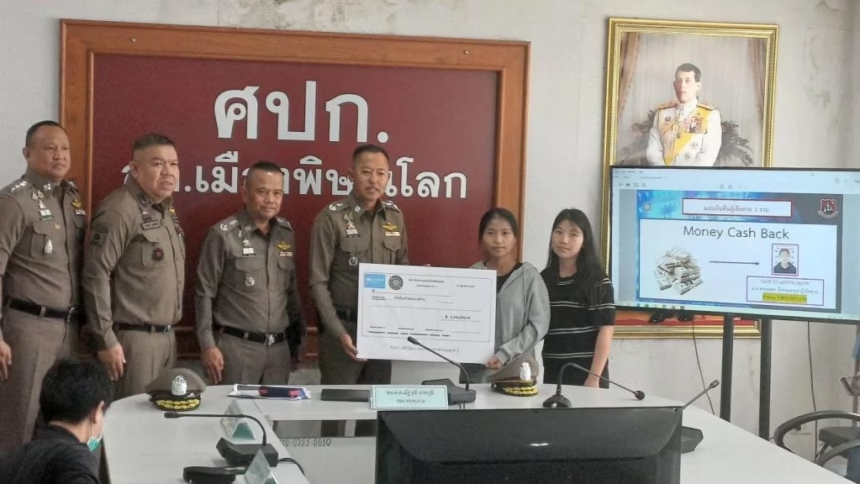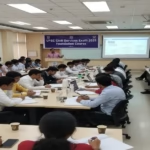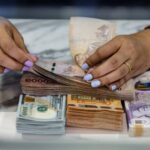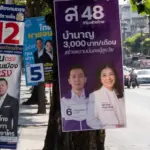PHITSANULOK – Police arrested a call centre scam network at a bank counter inside Central Phitsanulok after staff flagged repeated suspicious cash withdrawals totalling more than 3 million baht. Officers detained four suspects at the food court and seized 3,100,000 baht in cash.
The team later returned 1,900,000 baht to a Chiang Rai woman who had been tricked into transferring her savings. A further 1.2 million baht is being traced to identify the rightful owner.
A police spokesperson told CTN News that senior officers from Provincial Police Region 6 and Phitsanulok Provincial Police, together with investigators from Muang Phitsanulok Police Station, announced the arrests and the seizure.
The case began on 31 July 2025 when investigators were alerted to multiple high‑value withdrawals at Kasikornbank and Siam Commercial Bank counters inside Central Phitsanulok. Officers moved in and found four suspects, names withheld during the ongoing probe, carrying more than 3.1 million baht in cash.
A preliminary check found three over‑the‑counter withdrawals worth about 2,990,000 baht, linked to three victim accounts.
Chats on the suspects’ Telegram app showed contact with beneficiaries and a link to a Government Savings Bank account in the name of Ms. Phromphon, 22, who had been deceived into transferring 1,900,000 baht under a fake “Money Cash Back” programme.
The suspects could not explain the source of the cash. Police immediately seized 3,100,000 baht as evidence, along with several iPhones and a black Mercedes‑Benz. Investigators say the group split duties into two parts: money mules who opened accounts and withdrew cash at bank counters, and handlers higher up the chain.
Seven Suspects Charges
Seven suspects have now been charged, and officers are expanding the case to find more accomplices. Ms. Phromphon, from Chiang Rai, collected 1,900,000 baht in person at Muang Phitsanulok Police Station. The remaining 1.2 million baht will be tracked to identify other victims.
Police reminded the public that real officers do not ask anyone to transfer money for checking or to verify funds. If you receive such a call, treat it as a scam and hang up.
Ms. Phromphon said she works as a seamstress in Chiang Rai. In April 2025, she won first prize in the national lottery and received about 6 million baht. She gave 4 million baht to her parents and sister, and kept nearly 2 million baht.
On 30 July 2025, fraudsters phoned her, posing as bank staff, claiming her account had been used for illegal activity and urging her to report it. The call was then switched to a fake police officer who took a “report” and told her to transfer her remaining funds for inspection, warning her not to tell anyone, not even family. She transferred 1.9 million baht.
Her real bank later called to confirm the transfers. She realized it was a call centre scam, reported the crime at Ban Du Police Station in Chiang Rai, and today received 1.9 million baht back. She thanked the officers involved in the case.
Scam Gangs in Northern Thailand
Scam gangs in northern Thailand primarily refer to transnational criminal networks, often led by Chinese organized crime syndicates, that operate online fraud operations along the Thai-Myanmar border.
These groups exploit Thailand’s proximity to Myanmar’s unstable border regions—such as Myawaddy, Laukkaing, and KK Park—where scam compounds are housed in areas controlled by ethnic armed groups or the Myanmar military.
Northern Thailand provinces like Chiang Rai, Chiang Mai, Tak (Mae Sot district) and Kanchanaburi (Sangkhla Buri) serve as key transit points for recruitment, trafficking, and logistics, rather than primary operational bases.
The industry is estimated to generate up to $2 billion annually in losses for victims worldwide, with Thailand reporting 78.8 million scam incidents since 2023. These gangs target victims globally, increasingly including Americans, through social media lures, fake job offers, and romance scams.
Advice for Travellers and Residents
Northern Thailand’s border areas are high-risk for job scams or abductions—avoid unsolicited offers, especially in Mae Sot. Use official channels for employment; report suspicions to Thai Cyber Police (dial 1441) or tourist police (1155).
Thailand’s tourism relies heavily on safety perceptions, so vigilance helps protect the economy. For deeper dives, monitor updates from sources like the Bangkok Post or USIP.














